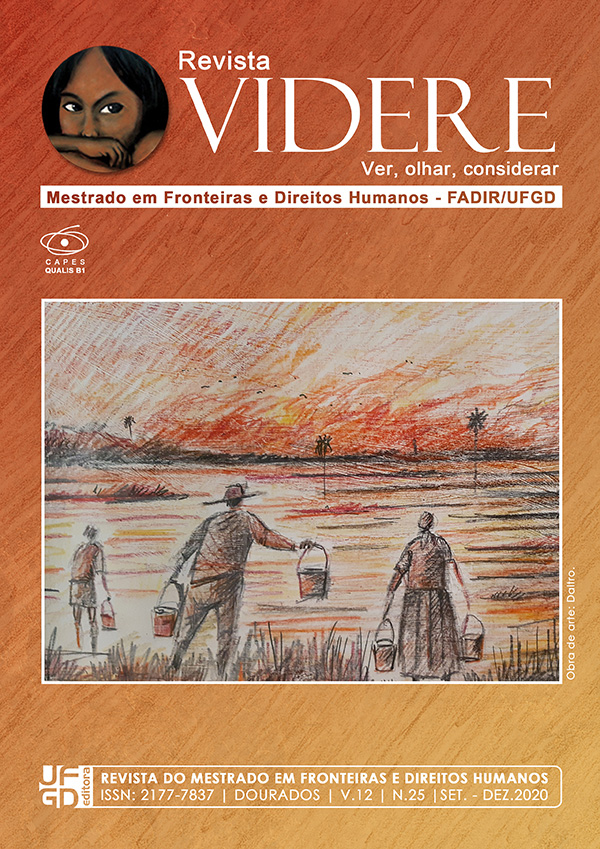Globalization and the protection of human rights in the digital world
DOI:
https://doi.org/10.30612/videre.v12i25.12729Keywords:
Globalization. Information society. Human rights. Privacy.Abstract
This article examines the globalization process and the emergence of the information society, analyzing the resulting impacts on human rights. It also deals with how technology has contributed to accelerate asymmetries in the contemporary world, while allowing waves of resistance, generated quickly and dynamically from the mass of available knowledge, allowing articulation between groups of individuals around varied social and environmental agendas. Dealing with this challenge leads to the need to build the foundations, including the protection of rights, for technological, political, economic and cultural cooperation that allows taking advantage of the digital world and its potential for connections and mobility to propose effective and equitable solutions to problems of the world.Downloads
References
BAUMAN, Zygmunt. A ética é possível num mundo de consumidores? Jorge Zahar Editor Ltda, 2013.
BOBBIO, Norberto. A era dos direitos. Rio de Janeiro: Campus, 2005.
BRASIL. Lei nº 13.709, de 14 de agosto de 2018. Lei Geral de Proteção de Dados Pessoais. Diário Oficial da República Federativa do Brasil, Brasília, DF, 15 ago. 2018. Disponível em: http://www.planalto.gov.br/ccivil_03/_ato2015-2018/2018/lei/L13709.html . Acesso em: 13 jun. 2020.
CASTELLS, Manuel. Reflexions on the Internet, Business, and Society. Oxford Press, 2002.
GOUVEIA, Luis Manuel Borges. Sociedade da Informação - Notas de contribuição para uma definição operacional. Disponível em: http://homepage.ufp.pt/lmbg/lg_com2.htm. Acesso em: 20 jun. 2020.
MCLUHAN, Marshall. O meio é a mensagem - Os meios de comunicação como extensões do homem. 9. ed. São Paulo: Cultrix, 20ª ed. 2011.
ORGANIZAÇÃO DAS NAÇÕES UNIDAS. The age of digital interdependence - Report of the UN Secretary-General’s High-level Panel on Digital Cooperation. Disponível em: https://www.un.org/en/pdfs/DigitalCooperation-report-for%20web.pdf. Acesso em: 20 jun. 2020.
ORGANIZAÇÃO DAS NAÇÕES UNIDAS. Comissão de Direitos Humanos. Resolução 42/15 – The right to privacy in the digital age. Disponível em: https://documents-dds-ny.un.org/doc/UNDOC/LTD/G19/282/23/PDF/G1928223.pdf?OpenElement. Acesso em: 13 jun. 2020.
SOUSA SANTOS, Boaventura de. Por uma concepção multicultural de direitos humanos. São Paulo: Revista Lua Nova. Vol. 39, 1997.
TORRADO, JESUS LIMA. Globalización y Derechos Humanos. Anuário del filosofía del derecho: 2000. Disponível em: https://dialnet.unirioja.es/descarga/articulo/142424.pdf. Acesso em: 20 jun. 2020.
Downloads
Published
How to Cite
Issue
Section
License
Authors must accept the publication rules when submitting the journal, as well as agree to the following terms:
(a) The Editorial Board reserves the right to make changes to the Portuguese language in the originals to maintain the cultured standard of the language, while respecting the style of the authors.
(b) Authors retain the copyright and grant the journal the right to first publication, with the work simultaneously licensed under the Attribution-NonCommercial-ShareAlike 3.0 Brazil (CC BY-NC-SA 3.0 BR) that allows: Share - copy and redistribute the material in any medium or format and Adapt - remix, transform, and create from the material. CC BY-NC-SA 3.0 BR considers the following terms:
- Attribution - You must give the appropriate credit, provide a link to the license and indicate whether changes have been made. You must do so under any reasonable circumstances, but in no way that would suggest that the licensor supports you or your use.
- NonCommercial - You may not use the material for commercial purposes.
- Sharing - If you remix, transform, or create from material, you must distribute your contributions under the same license as the original.
- No additional restrictions - You may not apply legal terms or technological measures that legally restrict others from doing anything that the license permits.
(c) After publication, authors are allowed and encouraged to publish and distribute their work online - in institutional repositories, personal page, social network or other scientific dissemination sites, as long as the publication is not for commercial purposes.



















